#fet gede
Explore tagged Tumblr posts
Text
More Pics From Fet Gede.
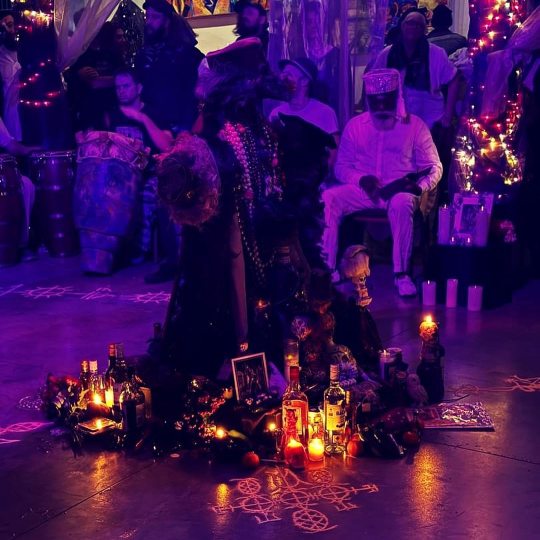
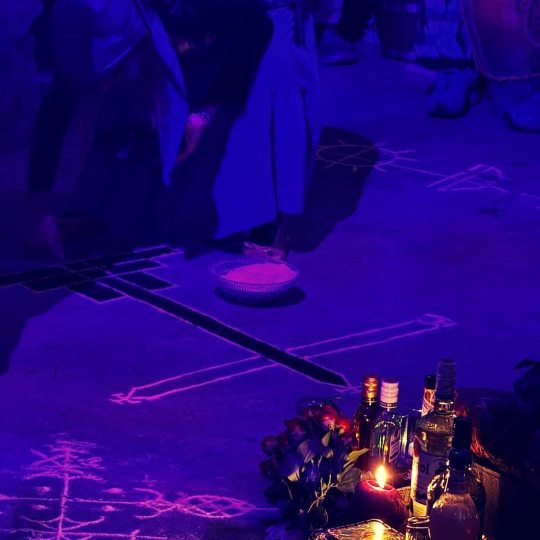
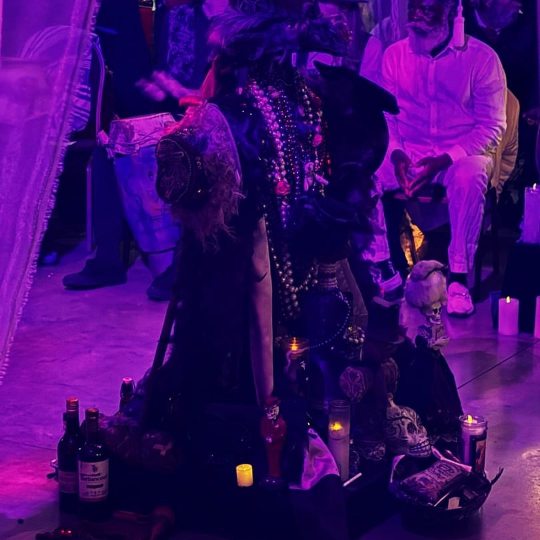
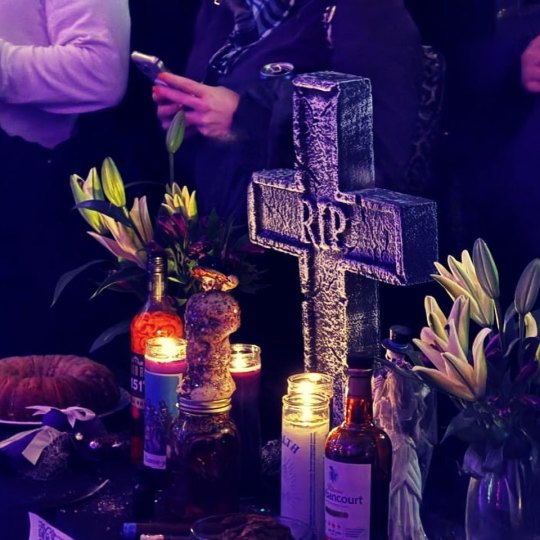
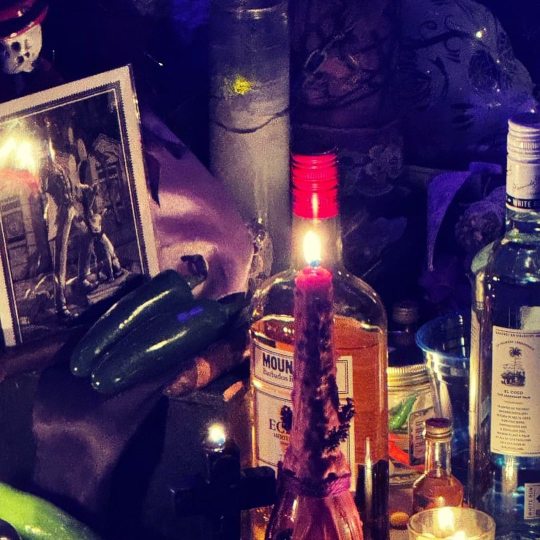
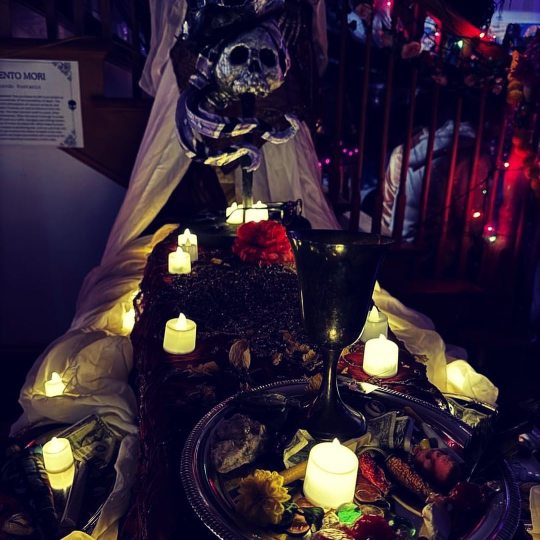
#fet gede#vodou ceremony#lwa spirits#gede spirits#spiritualism#voodoo altar#like and/or reblog!#follow my blog#african diasporic#african spirituality#new orleans voodoo#voodoo ceremony
9 notes
·
View notes
Text










Herbal and crystal infused inspired by Anubis, Osiris, Anubis, Hekate, Bawon, Brijit, and select Gedes! Check out Aligned Supply’s inaugural Spirit Series on Etsy!
💜🎃🖤👻🧡
#aligned supply#manifestation soaps#spirit series#Halloween#Dia de Los muertos#Fet Gede#Bawon#Brijit#Gede Nibo#Gede Zarenyen#Osiris#Anubis#Hekate#herbal soaps#Crystal soaps
3 notes
·
View notes
Text
#Culture#world#Haiti#setsubun#fet gede#samhain#Japan#Catalonia#Festivals#spooky#dia de los muertos#correfoc#Awuru odo#basler fasnacht#Nigeria#Switzerland
2 notes
·
View notes
Text
Raising the Dead
I've been sitting with what I have learned and experienced this past Gede season and it feels strangely appropriate to write about that on a day given to Lazarus, the man who died and then lived again.
Gede and I have a long, LONG history. It was Gede who stood waiting for me to get myself to a fet and, as he put it, it was Gede who walked with me through my life (even when I didn't know it) and kept me alive to have the opportunity to step into the djevo. It is Gede who has been my foundation and Gede who has worked tirelessly in the background to help me consistently build myself back better than I was before; whether it was before kanzo or before maryaj or even better than I was last week.
Gede was the first lwa I encountered in Haiti, in the head of the houngan who would later become my husband, and that Gede has always been important to me. For quite awhile, I didn't understand and didn't look at the importance of the same Gede coming in the same head at very important times for me....but I get it now. S (my human husband) has a strong, STRONG relationship with his Gede and it was his Gede that gave me the opportunity to make the choice in Haiti before I entered the djevo: was I going to actually do all of it in the way it was intended, or was I going to shrink back and hold myself like and as an outsider?
I didn't totally understand that choice in the moment, but I did know that when Gede dragged me (kinda literally) into the middle of the temple during bat gè and demanded a gouyad out of me, the person who does not dance well at ALL. But, I had decided in the midst of my personal misery preparing for kanzo that I was all in and would do whatever was asked of me because, up until that point, my way of doing things was not helping me. That gouyad changed my life, honestly. The same Gede dragged me back for more gouyad after kanzo, and this time it was a literal dragging because I was very clear on the post kanzo instructions that I was not to interact with the dead for the period of my eprèv and I didn't know what to do. There is video of my sort of gesticulating wildly at my godfather and my friends as Gede took me by the arm, dragged me in front of the drums, and asked for a little more gouyad.
It was also that Gede who came to to my maryaj lwa and placed the rings I had bought for Gede on our fingers, and that same Gede who, when he comes down for his fets, has me running for him. He reminds people on the regular that I married him before I married the chwal/my human husband, and intercedes (without my asking) when other Gede start asking me for things and favors because it is he who takes care of me.
I also relate to Gede in a very different way than I sometimes see others relating to Gede. I find Gede to be very, very serious and I don't often get the dick joke kind of Gede that people most relate to. To me, Gede tells jokes to be able to say the things that people would otherwise be unable to hear, and I am a person who just gets confused by that, to be quite honest, because if I am going to hear hard things and someone is laughing about it, I get lost a bit...like why is it funny? That's not to say Gede has not done that; Gede in my husband's head is notorious for poking fun at me and at times exploiting the fact that, while I speak Kreyòl quite well at this point, I am not quite fluent enough for everything and particularly not for understanding the dialect that S's Gede will speak at times. It always comes with a blessing, even though I may not see it in the moment.
This year, I have been reminded just how close to me Gede always remains. That has been drastically underlined since S arrived in the US, and it has been kind of amusing to experience.
I work occasional overnight shifts at a side gig (because what houngan/manbo does not hustle for their lwa...), and more than once I have come home to find S not in our bed but sleeping in lwa room, which is not in and of itself weird. Vodouizan do that frequently as a devotion or to generate dreams or for any number of other reasons. It is, however, kind of strange to stick your head into the lwa room and see your husband laying on the floor like he is in the grave (arms crossed on his chest while he lays on his back) with a black moushwa over his face.
It's even stranger when your husband sits up and you realize it is your Husband who has come to see you and remarks that it is about time that you got back from work because he has been there waiting for you since before the sun came up. Having chats with Gede at 7AM after working all night is certainly a challenge but it is it's own blessing. He has detailed a lot of important stuff for both myself and my husband that needs to get done, and confirmed a lot of things that I had thought about before.
The confirmations are part of the lesson for me. I approach most things spiritual with a critical eye; I look to see if what I believe the lwa are telling me makes sense with what I already know, if it seems supportive of me versus undermining what the lwa have already put in place, and if it is going to harm me or other folks. Those are my basic guidelines for looking at what I hear or intuit, and even then my reaction is, unless it is something that has to be done immediately, I kind of put it on a shelf and just watch how things unfold.
It is absolutely wild to me to sit and chat with one of my lwa and have them declare the same things I have heard on my own and have not shared with others. To me, that reveals that my default is to sort of not believe what I am hearing and not give it the importance that it deserves. Like, Gede sat there and talked about one of my personal Gede whose name I have never spoken to another person--not even my husband--and spoke about them by name. He talked about other spiritual things that I had not brought up to anyone at all and just held to myself and my takeaway is that I need to trust what I hear more.
It reminded me of something I heard at Gede's fet at my spiritual mother's house. Ogou came to speak with his children, and I overheard something he told someone else: you can hear me in your head when I speak, so why do you wait to hear it from my mouth? Over the past decade my lwa have developed and refined me enough that I don't need to speak with them when they are in a head all that often. Sometimes it's useful to clarify something I am not understanding or in a very difficult situation, but by and large I hear them quite clearly, understand what they are saying, and have the tools to communicate with them. The first thing my mother taught me was how to pray and use my table, and I consistently do not give that the importance that it really holds.
The other side is that I sometimes don't pay attention enough to how they speak, in that after a decade of them telling me things, the way they speak has become more streamlined and requires very few grand gestures. Before it was them pulling out all the stops and sending very in-depth and detailed dreams. Now it is the things that occur to me when I sit and pray, or that occur to me when I am sort of contemplating a situation that I or someone else has been struggling with. They certainly do still send dreams when they want to underline something, but it has become much more of a ingrained process. In a way, it's been a manifestation of one of my most long term prayers: I want there to be no distance between myself and my lwa, and I do not want to be able to find the border where they begin and I end because I want them so enmeshed in my life and me so enmeshed in them that I move with them easily and fluidly.
And so it is.
This past season of a reinvigorated death has also got me rolling around with my ancestors again in a different-than-usual way. I have always had a complicated relationship with my ancestors because my relationship with my family is complicated, but they have gotten louder and louder, and that means it's time to take a deep breath and dig back in. In the last year, I uncovered a big giant gaping wound that has led to some of the problems my family currently experiences. Not a generational curse, really, but the reverberations of a massive tragedy that my ancestors were involved in that has never been addressed. Looking at what has happened in one branch of my family since that tragedy, and it's absolutely clear that the damage from that has radically changed the descendants. I don't even think most of my living family from that side have any knowledge of what happened; it took a lot of careful reading for me to get it.
I also visited the grave of a family member I was close to in life and that reawakened him. Standing in front of his grave and feeling his shock that I had come after being away for so long was kind of a shock to my system, and he's come to speak with me since and outline what he really needs.
The bottom line that my ancestors have highlighted is that my family is unwell because my ancestors are unhealed and problems have gone on for generations unaddressed. This has created a poison well of sorts, and here we are. Through probably a mix of accident and ancestral wrangling, I am the only living member of my family who hears (or knows they are hearing) the ancestors and so they have been clear that it is my responsibility to do the work to change things so that there is peace moving backwards in time and peace moving forward.
I am not exactly thrilled about this. It's not a surprise because I have been told this before and purposefully ignored it. However, life circumstances have changed and I am no longer in a space where I can ignore it. When I look at the scope of what must be done, I kind of look at my ancestors and ask where my staff is and how I am going to get paid for this, because it is A LOT.
I know the answer to those questions (I am the staff and the pay comes later), so I guess it's off to work I go? I don't know. I have a lot of personal background working with difficult ancestors, but I am going to be fumbling through how I address the ancestral weight of mass tragedy. People don't write books about that kind of ancestral veneration, but maybe that's also part of this work because I can't be the only one dealing with ancestral mess on a grand scale. Just another opportunity for personal growth and development, I guess.... These moments get tiring as I get older.
Now we are solidly in Makaya season, which closes out our year and dictates what our new year will be like. It is not gentle or nurturing; it is the expectation of rapid change and assertive (an understatement) presence of spirit. In common culture, this is the time of year that commemorates the divine taking on flesh, and in Vodou that is one of the most spiritually hot and spiritually significant events in our day-to-day. The lwa come into heads to bring us direct change, deliverance, healing, and hope. With the mess that the world is today, we need that and particularly the focus of healing and hope. Makaya's healing is not gentle and not without it's own kind of suffering; after all, the poto mitan is on fire and the Petwo lwa arrive screaming.
May the heat of the flames burn away all that I do not need and all that holds me back, and may the leaves and medicine find their way to the parts of me that need healing and wholeness. May I hold onto the hope that comes from the fire, because what is burned away will bear new life. May the soil be rich and may I be receptive.
17 notes
·
View notes
Text
Olvera Street Día de los Muertos, Los Angeles, California October 25–November 2 Day of the Dead, San Antonio, Texas October 25–November 7 Día de los Muertos Xicágo, Chicago, Illinois October 26 Viva La Vida Festival, Austin, Texas October 26 Day of the Dead San Diego, San Diego, California October 27–November 3 Day of the Dead/Fet Gede, New Orleans, Louisiana November 1 Day of the Dead Festival of Altars, San Francisco, California November 2 Muertos y Marigolds, Albuquerque, New Mexico November 3
1 note
·
View note
Photo

Grand Cemetery, Port-au-prince, Haiti
#Grand Cemetery#cemetery#lwa#gede#guede#ghede#fet gede#Haitian art#Haiti#Haitian#vodou#vodoun#voodoo
448 notes
·
View notes
Link
Extremely interesting read. I got to know some practitioners, including a houngan, when I lived in New Orleans, though the voodoo-inspired faith found there is of a different than what comes out of Haiti. Fascinating topic of study either way.
0 notes
Text
While something popularly written about and, in very few cases enshrined as an almost pop culture reference in some pieces of the Haitian Vodoy community, the theory/rumor the Gran Brigit/Manman Brigit is related to or derived from or really is St Brigid falls from one source that is widely known as deeply problematic and outright fraudulent, and likely made it up as both a religious Mary Sue and a way to draw in folks curious about Vodou who were coming from neopaganism.
There is no history of Irish indentured servants on the island of Hispaniola, at all. The island was colonized by the French and Spanish, back and forth, with some sideline American action in there. The British monarchy was the colonial power dealing in Irish indentured servants, and they had no foothold on Hispaniola. The historical trope of Irish indentured servants gets brought up a lot, likely as a mechanism of trying to create an equality of suffering that historically did not exist. The colonial powers on the island had no need of indentured servants that would have had to be granted land, be paid, and treated reasonably well. They had plenty of enslaved Africans to do all that work for nothing.
Similarly, Gran Brigit is not presented as white. The lwa who embody death, such as Brigit and her husband Bawon Samdi, can often appear pale because they are dead, but they are not white. Some spirits do portray themselves as white or white-passing for many reasons, with many of them being some of the most well-known spirits in the religion; Damballah Wedo, Agwe Tawoyo, Ezili Freda, Ogou Sen Jak, and others. Lwa who often appear with very light or white skin are often lwa who are considered to be or descend from royalty, are largely 'cool', who are concerned with cleanliness and purity. Brigit does not really fit that mold.
Brigit also does not dance or do much of anything in possession. As she is the embodiment of death when she arrives in her chwal, she is laid out as death is; she lays still on the ground wrapped in a shroud with her jaw tied closed, cotton placed in her nostrils, and occasionally her face powdered to give the pallor of death. The family of Gede are the elevated dead who dance; the banda is theirs, as is piman (peppered rum...we joke that it is Haitian tear gas, but it is called piman) and they are who engage in lascivious behavior. Brigit (who prefers sweet drinks) and the family of spirits called Bawon are dead serious (literally). They are the implacability of death, the dug grave, the finality that we all face.
'Tis the season to check your sources on death and the dead in Haitian Vodou!







Maman Brigitte is the only white spirit of the Vodou Lwa. From a folklore perspective she became a part of Vodou through indentured Irish women sharing their stories of St. Brigid who is a very obvious christianization of the Celtic goddess Brigid.
From a metaphysical perspective the goddess Brigid continued to be worshiped as St. Brigid. She then immigrated with the Irish to Haiti & the US. She married Baron Samedi, the chief Lwa of death.
For me as a person of predominantly Celtic decent steeped in the black community I’m very drawn to Maman. Learning more about Maman is helping to learn more about myself, my heritage, & where my place is in the scheme of things.
#vodou#haitan vodou#real vodou#gran brigit#manman brigitte#gede#ghede#fet ghede#fet gede#voodoo#new orleans voodoo
193 notes
·
View notes
Text
Some Pictures I Took From Fet Gede.
I enjoyed this years Fet Gede. This Sosyete not only celebrates the spirits here in the city. But respects and honors others Day of the Dead traditions also.
Fet Gede in Haiti is just such a past-honoring event. Known as the Festival of the Ancestors, Fet Gede ( = The Sacred Dead) is the Vodou equivalent of Mardi Gras, the Mexican Day of the Dead, and Halloween, all in one. So everyone dresses up.
But here are some pics I took while I was there. Check back for the video.
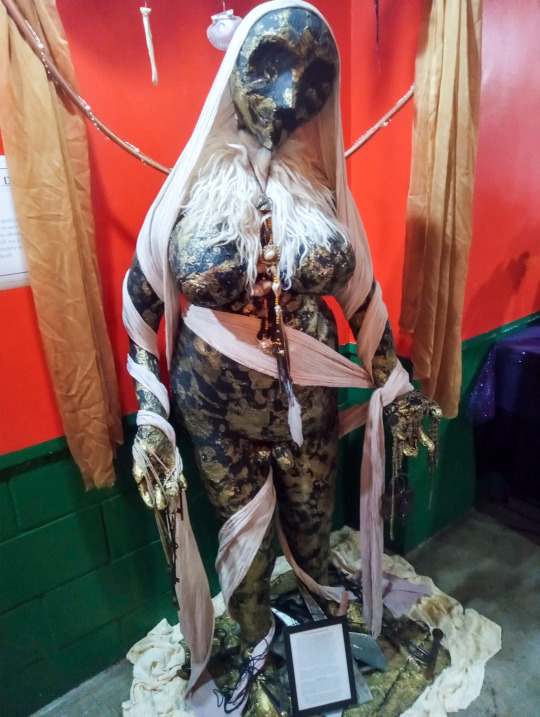
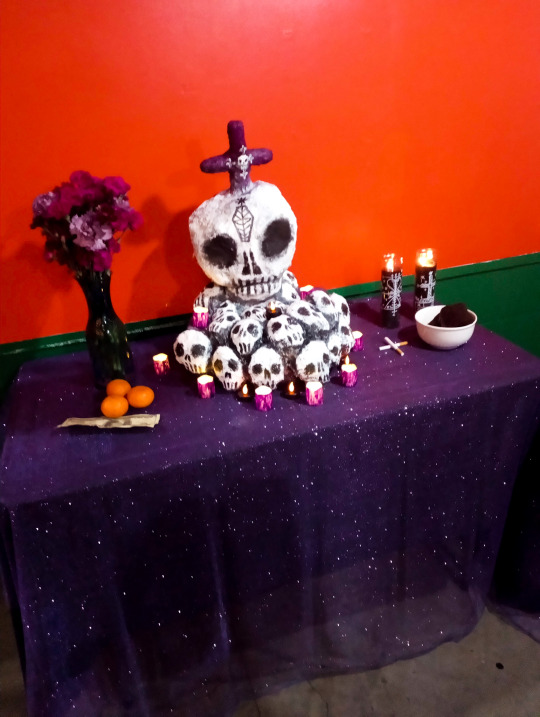
Spirit Statue. Gede Statue
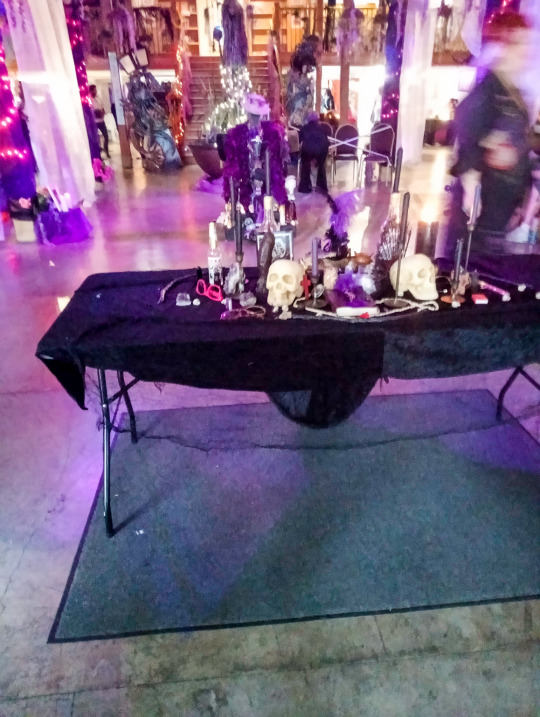
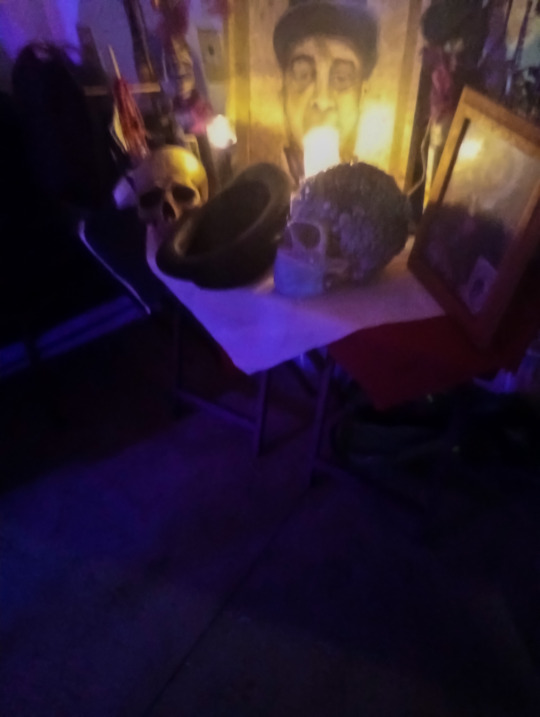
Baron Altar. Baron La Croix
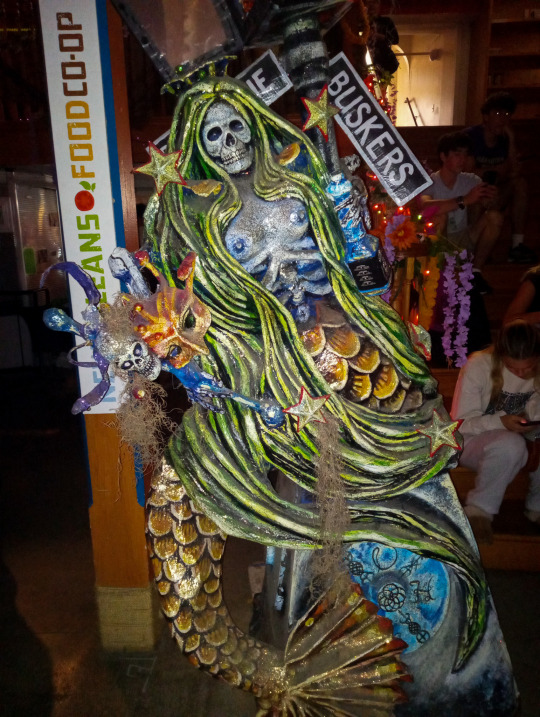
Some kind of death mermaid statue.
It's cool.
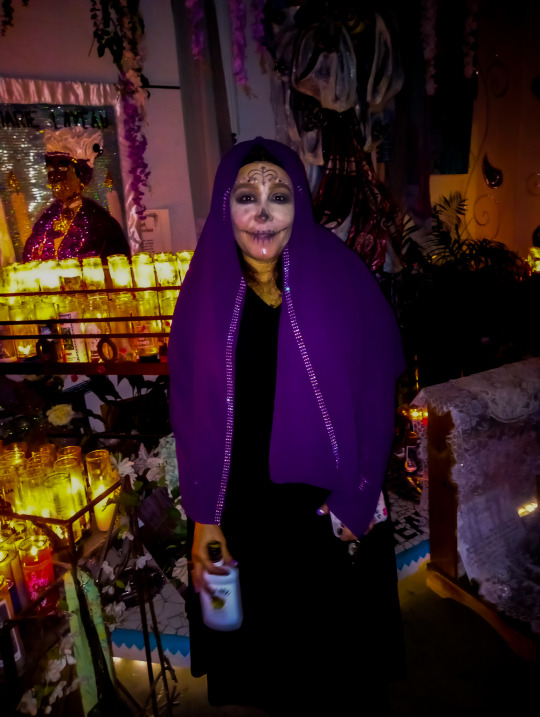
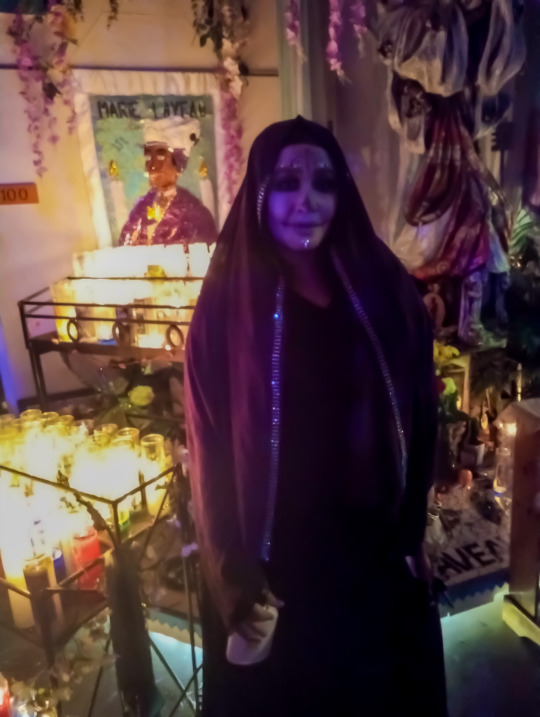
One of the children of the spirits dancers in the Oufo. Dressed as a spirit of the Dead. Gede.
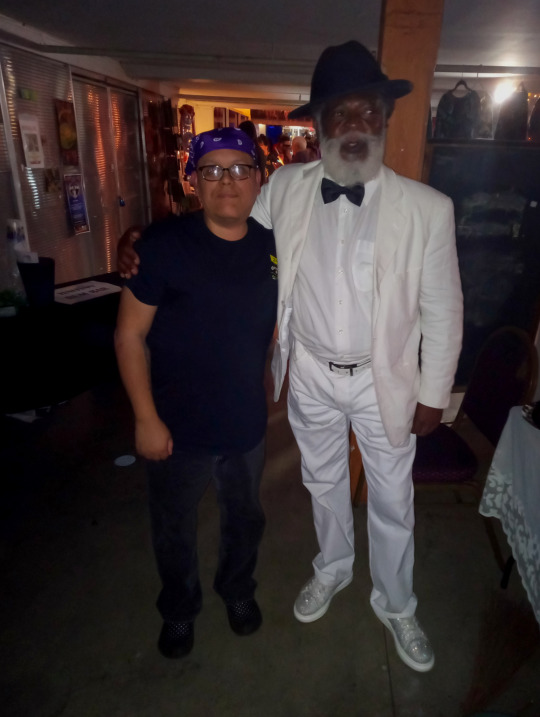
🖕Me and Ghanaian Priest & Master Drummer Osofo Andrew.
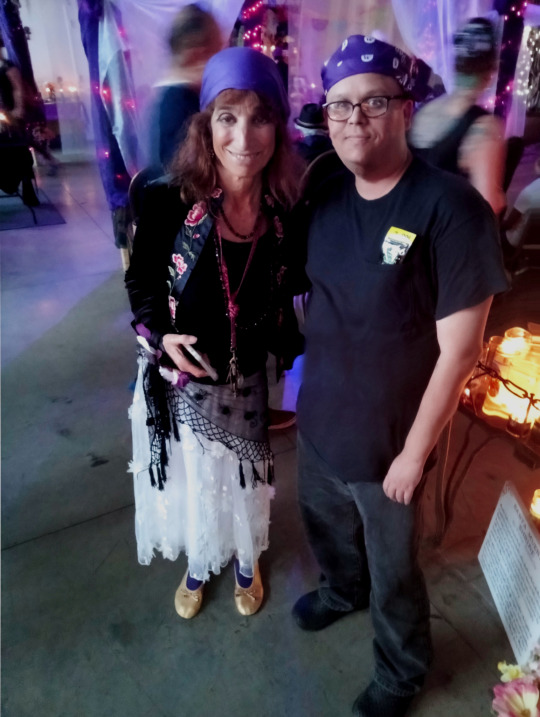
🖕 Me & Mambo Sally.
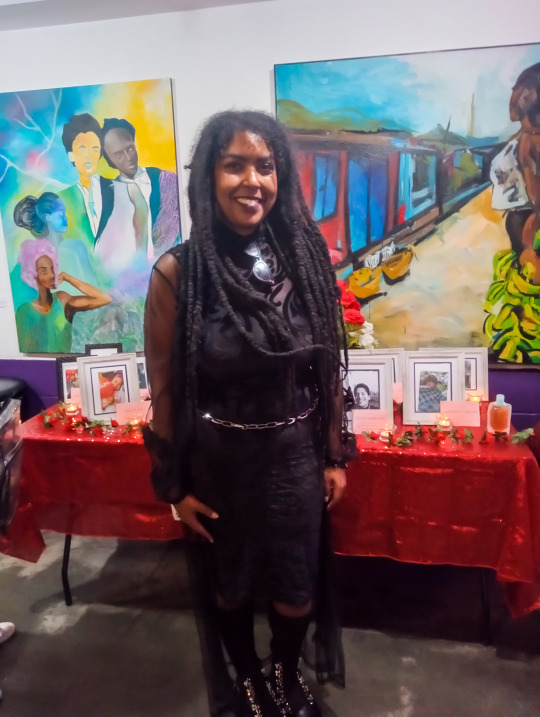
Taja Nicholle is a Afro-Indigenous Certified Death Doula/Grief Support Counselor. She's does death healing, cleansings readings, Sound Healing, etc.
https://www.therisingroseco.com/

I meet these women and though there costumes were cool.
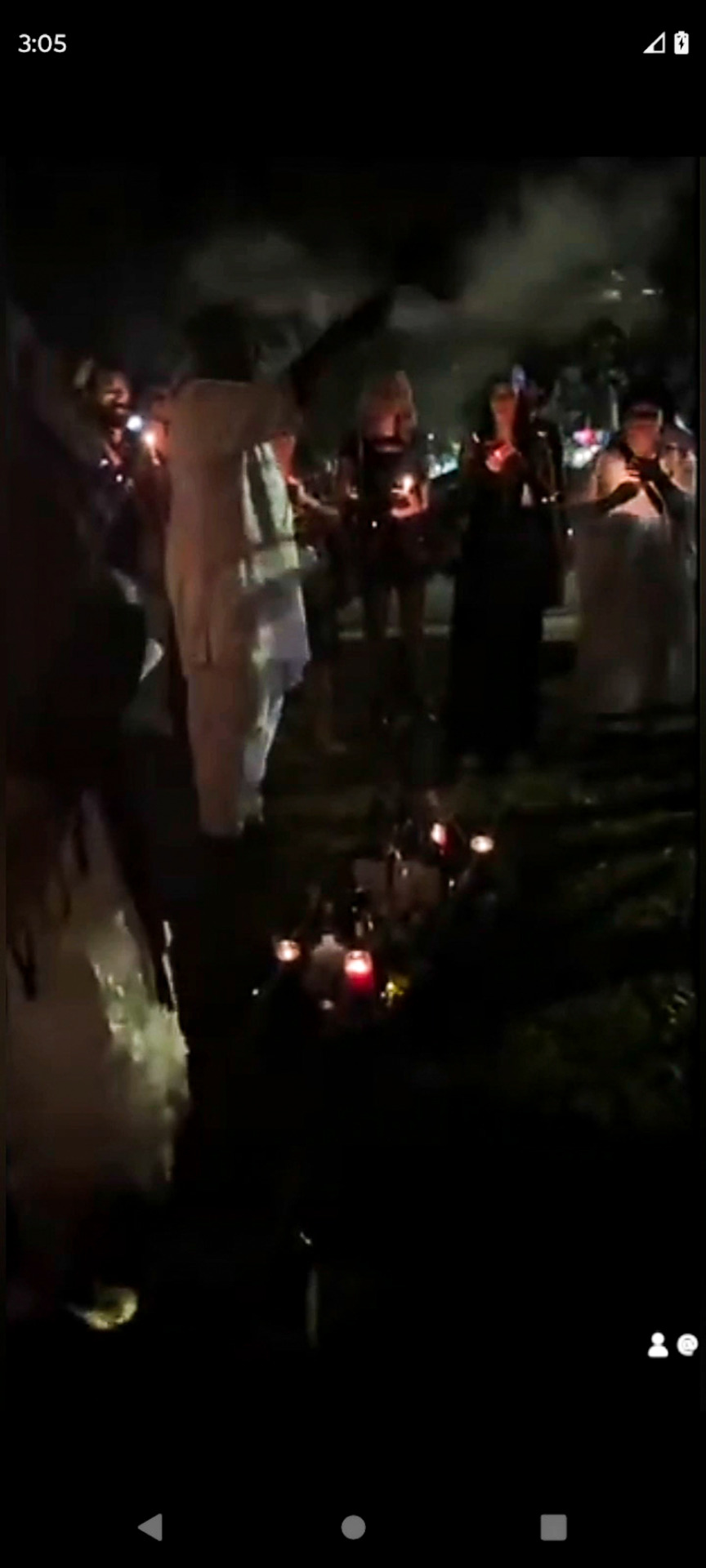
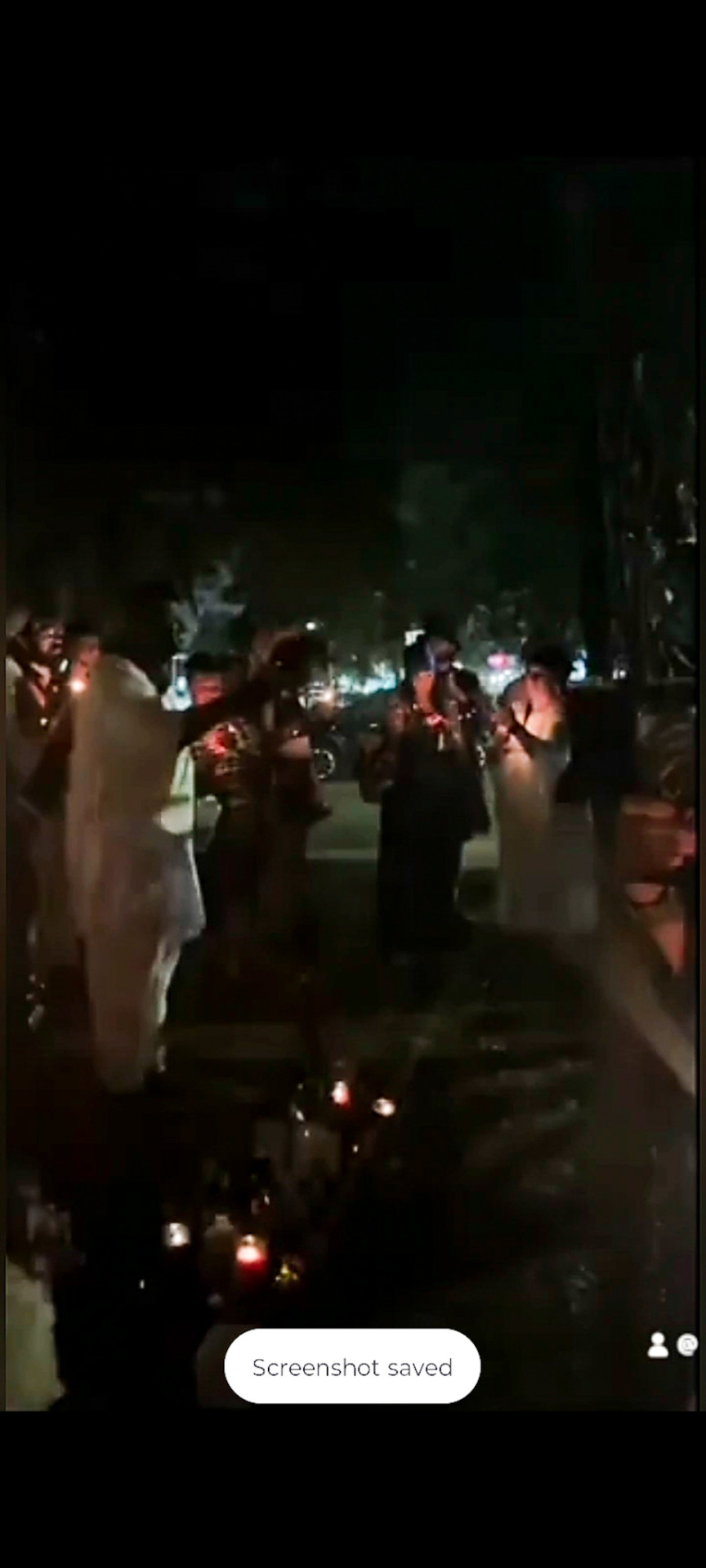
🖕 the top is of a Haitian Oungan he and Andrew and some others released the Gede spirits after the Fet Gede was over. We told them thank you and then we all sayed a prayer.
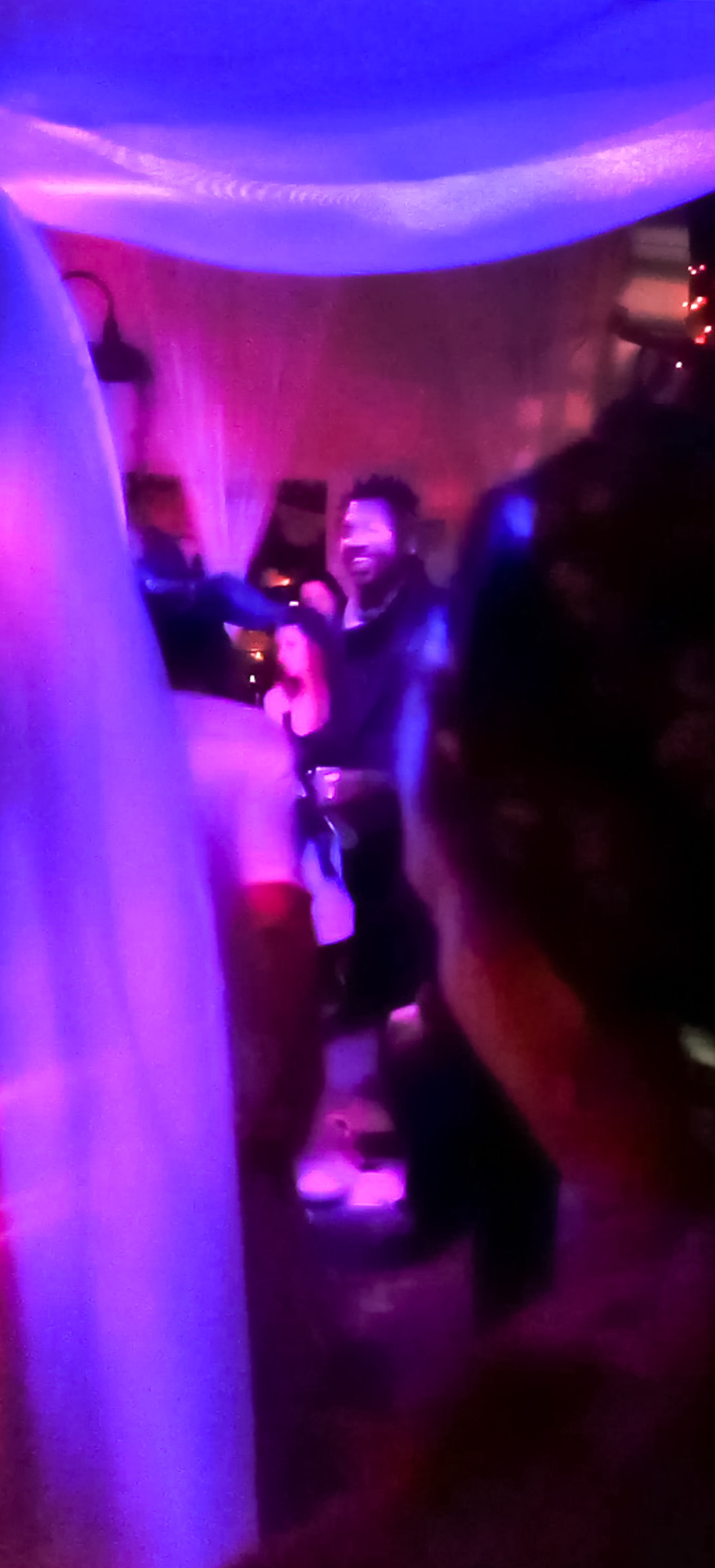
This is the Haitian Oungan with the white powder on his face he was dancing and smoking cigarettes the spirits came and jumped a few people that night.
#like and/or reblog!#google search#follow my blog#ask me anything#haitian vodou priest#haitian vodou#Fet Gede#voodoo priestess#Voodoo altar#dia de muertos#catrina#Baron La Croix#new orleans voodoo#Blessing.#new post
8 notes
·
View notes
Text

I. Can’t. Wait.
🕶💀🚬
Will you be there???
💜🎩🖤
8 notes
·
View notes
Video
instagram
#fet #guede #ghede #gede #haitian #vodou #voodoo https://www.instagram.com/p/BcECqH5gr-t/?utm_source=ig_tumblr_share&igshid=bin7nanyh47x
2 notes
·
View notes
Note
What happens to regular food offerings in a house altar? I noticed that the ones served in fèts are eaten (with a few exceptions of burying them, sending them out to sea on a bak, or disposing in other ways) but wanted to know if practitioners ate offerings made to the Rada, Petwo, etc. or had to let them rot and then dispose of them.
Hi,
It depends on what it is and what the purpose of it is. If I prepare food for my lwa at home just as an offering, I don't eat what I place for them. I might eat leftovers from cooking if there are any but what goes on the altar is for them only. Often there is a prescribed amount of time for it to sit there, either as informed by the lwa or as a standard thing, and then food is disposed of. Letting it rot sometimes is a prescription (and a good one!), and sometimes would be wholly inappropriate, like for Ezili Freda, Danbala, and most of the Rada lwa and a bunch of others.
An example of what might happen with food is what Gede asked of me recently. Food was prepared for him for his fet, and he came and ate it and enjoyed it...but he also wanted me to have similar done for him in Haiti and told me I could not dispose of his food here until I had the work done in Haiti. I was to take his food home, place it with his things, and keep it there until the work was completed. It took a minute to coordinate money, seek out what he likes to eat since it is different than what most Gede eat, and then have our folks down in Haiti prepare it in our lakou and deposit it. So, I had a basin of rotting manje Gede that I couldn't get rid of until I received the confirmation that it was done by my adopted son. I was kinda grossed out, this particular Gede was very amused by my distaste. When it could be disposed of, it went into a bag and into the trash.
In Haiti, food that won't be eaten would traditionally get deposited under a tree but that's often hard to do in the US if you don't have a yard. I don't, so what I do is place everything in its own plastic bag and then place it in the trash for disposal.
A sometimes exception is fresh fruit or vegetables. For example, I just did our household service for Kouzen and gave him a bunch of fresh fruit and vegetables. The service is finished, the prescribed period is over, and the fruit/veg is still good so it will go into our kitchen to eat. Kouzen is not going to ask me to sacrifice food I can eat.
Hope this helps!
5 notes
·
View notes
Text
Alastor Ascension Arc
Alastor Ascension Arc
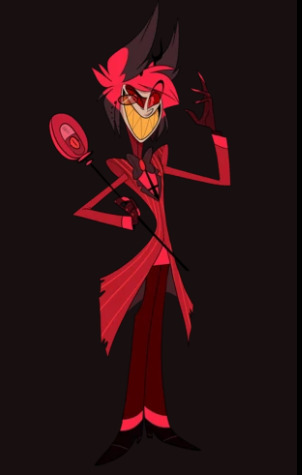
Part 1: 1896-1933 Human Life in New Orleans
Part 2: 1933 Arrival in Hell
Part 3: 1933-1940s Meeting Rosie and Mimzy
Part 4: 1950-1952 Making a Deal with Niffty
Part 5: 1953-1966 Alastor vs Vox
Part 6: 1970-1975: Making a Deal with Husk
Part 7: Alastor Prequel Comic
Part 8: Alastor in the Pilot: That’s (Alastor’s) Entertainment!
Part 9: Alastor on Hazbinstagram
Part 10: Alastor’s Parents
Part 11: Three Vs Attack Pt 1
Part 12: Manipulating Charlie and the Magnes
Part 13: Evil Charlie Unleashed
Part 14: Alastor Temporarily Takes Over Hell
Part 15: Rosie’s Deception
Part 16: Eldritch Family Rise
Part 17: Three Vs Attack Pt 2
Part 18: Adina influences Alastor
Part 19: Heaven and Hell War, Alastor joins Hell’s rebellion
Part 20: Alastor’s Redemption – Mother Reunite and Heaven
Part 1: 1896-1933 Human Life in New Orleans
“Murder On The Air”
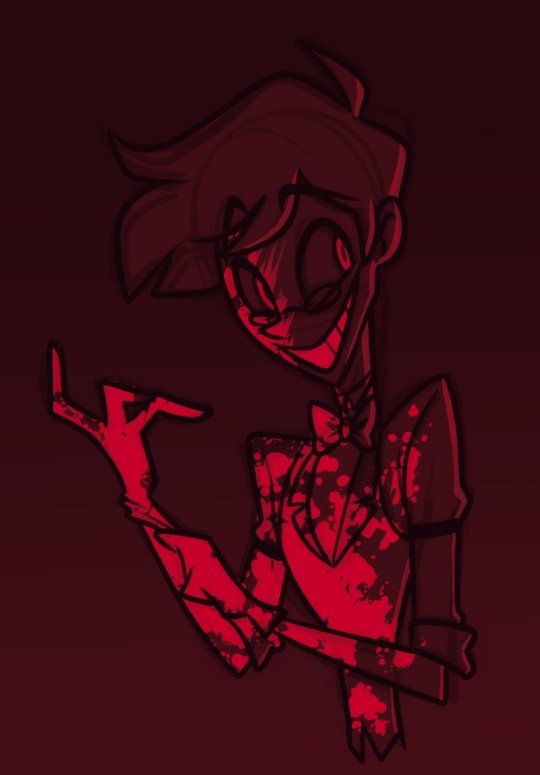
Art by Ashley Nicholas
“You’re Never Fully Dressed Without A Smile”
Chapter One: “Down in New Orleans”
Alastor Roscoe Moreau (A.M.) is born January 24th 1896 (VA born Jan 24th 1986) to his parents in New Orleans, Louisiana. Alastor has medium olive brown skin, short brown hair and brown eyes with glasses. He is lanky and thin but appears stronger than he looks. He often wears nice shirts with bow ties and dark pants and shoes. He wears overalls, boots and the occasional straw hat whenever he hunts or explores the woods and swamps outside. During his rise to fame, he wears fancy suits and top hats, complete with a microphone cane with golden antlers.
Armand Louis Moreau is Alastor’s French Canadian white father. He is a tall strong man with white skin, dark brown hair and a beard. His hobbies include going to church, hunting, taxidermy and drinking with his friends. Armand meets his wife and they soon fell in love. But Armand’s parents, Eugene and Manette disapprove of his interracial marriage. He becomes distant with them, only allowed to be back in the family when he divorces his wife.
Antoinette Loretta Moreau (formerly Duvalier) is Alastor’s French Creole mother. She has short curly black hair and dark brown skin, often wears cotton dresses and round ladies’ hats in bold red. She is part African American and part Native American and can speak Haitian Creole. In secret, away from her Christian husband, she asks her ancestors for guidance and reveres the Loa and saints, sitting at an altar she made. Antoinette’s white mother, Odette is a Voodoo Queen who reveres Yemaya and the saints. Odette’s husband, Mathis, is an African American musician, who later helps Alastor start a music career. Armand’s parents wanted Antoinette to abort her child as Alastor was perceived as a “troubled mixed child of sin,” but she refused. Manette offers to put Alastor in an insane asylum “for his own good”, but Antoinette fights back to keep him. Mathis was also wary of Alastor, but later grew to like him, while Alastor’s paternal grandparents always treated their grandson like he was stupid and dirty.
Antoinette is the one who taught Alastor all his favorite hobbies: cooking, sewing, Voodoo rituals, French and playing instruments. From her, Alastor learned how to play the piano, sing and dance while listening to the gramophone in their living room. At school, Alastor loved theater and leaned to play the trumpet, violin, saxophone, and piano. He also improves on his dancing and singing. Alastor is bullied for being mixed, doing women’s work and not liking girls.
New Orleans culture is introduced, along with popular festivals, 1900s language and Haitian Creole. Armand and Antoinette briefly talk in French as well.
Chapter Two: “Runnin’ Wild”
Early 1900’s Alastor’s youth
In his early innocent days, Alastor goes with his family to theater shows and Mardi Gras festivals. He eats king cake and watches jazz bands play. As a kid, Alastor is marveled by the colors, sights and sounds of the parades, costumes and delicious Creole food. Young Alastor is oblivious to the fact that others look down on the Moreau family for their interracial marriage. The insults affect Armand, reminding him of his chiding parents, but Antoinette insists that they must keep raising their son to be strong and kind. Alastor meets his uncle and aunt and cousins, celebrating St. John’s Day, Christmas and Fet Gede (All Soul’s Day). Alastor could often be found playing in the woods and the swamp. He even makes friends with the alligators while keeping a safe distance from them.
Chapter Three: “What a Wonderful World”
Early 1900’s more Alastor childhood and learning
Alastor’s mother teaches him how to make jambalaya and the dish becomes his favorite food. It nearly killed her when a drunken Antoinette put gunpowder in the pan and it blew up in her face. Antoinette would always tell Alastor, “You’re never fully dressed without a smile,” and Alastor smiled ever since. Alastor likes black coffee, hard liquor, deer meat and elegant meals. Alastor does not like tea, Oreos, strawberries, canned foods or anything sweet.
Alastor also learns Native American myths from his mother, including one about the Wendigo. (Alastor’s shadow and full demon form would be associated with the Wendigo monster).
For the only time in his life, Alastor enjoys being around dogs without fear. Despite being perceived as “abnormal” by many, he is one of the nicest kids around. He reads a lot, and really got into cookbooks and joke books. Alastor and his mother dance together to the gramophone, singing together in pure bliss.
Alastor starts school in 1901 at age 5. He learns Creole from his mother and some French as well.
When Alastor goes to school, he eventually joins the band, despite him being bullied by both whites and kids of color.
Chapter Four: “When The Saints Go Marching In”
Early 1900s, Voodoo rituals
Along with sewing, cooking, and dancing, Antoinette also teaches Alastor about Voodoo/Hoodoo rituals, along with his Grandmother Odette Duvalier.
Alastor sews Voodoo dolls (but doesn’t use them to harm others), collects animal parts and herbs, later using them to curse the houses and hideouts of criminals. He learns the veves of the Loa and conducts rituals with red and black candles. He uses alligator blood for healing magic.
Alastor learns how to consecrate objects, mediate in front of altars and how to connect with his ancestors. He learns of Antoinette’s Native American heritage. He eventually connects with the Loa, most of all to Met Kalfu, the fiery trickster Loa. He learns of his mother and grandmother being prominent Voodoo queens/figures in New Orleans. Antoinette had to curb back her involvement ever since she married Armand, but Odette still maintained her strong connection to the community. Antoinette and Alastor frequently do rituals out in nature, always showing respect to Papa Legba, the Loa of the Crossroads first. Ironically, the child-like Papa Legba and his dogs shared a spiritual connection with the young boy before Legba’s Petro aspect Kalfu took over as Alastor grew up.
(The dogs being part of Alastor’s death could represent the consequence of Alastor abandoning his innocence and former faith in his family/ancestors. The dog is sacred to Papa Legba and Ogun, Loa of iron and warriors/hunters).
Odette and Antoinette warn Alastor not to use magic and Voodoo for evil (which he later does anyway). His spirituality would reflect what path he goes down. Antoinette told Alastor that Voodoo magic is used for healing and guidance. Alastor formerly used Voodoo magic for good until being corrupted by the dark influences of the Goetic demons and Met Kalfu. Antoinette reveres the Rada Loa and discovers that Alastor has a spiritual connection to Met Kalfu, a Petro Loa. This explains Alastor’s affinity with fire magic.
Odette and Antoinette’s hidden magic is a reddish blue, the colors of the Petro and Rada mixed. Alastor’s magic eventually becomes Petro red. In 1919 after making deals with Gnostic demons Abaddon, Furfur etc. (kill souls on Earth as sacrifices to gain more power in the afterlife), his magic becomes exclusively evil and powerful. As a consequence, he loses touch with his ancestors and the other Loa after the deaths of his parents. (Souls can use magic in other worlds but lays dormant on Earth).
Alastor later gets his magic in hell with Kalfu’s influence and on Earth, he calls upon Ogun to assist him with using knives, axes and other weapons. None of the Loa accept human sacrifices but the Gnostic demons do, thus how Alastor gained more souls and eventual power.
Antoinette notices her husband slowly growing more distant from his son as Alastor bonds with her more.
Chapter Five: “Smile”
1903: age 7
At first, Armand is friendly with Alastor, watching with pride as he grows up. But as time goes on, he becomes more distant and harsh. Armand’s exposure to church made him believe that Alastor was a spawn of the Devil. He forces Alastor and his mother to memorize parts of the Bible and to pray to God every day. When they refuse, they get beaten up. Antoinette always cries in despair when she has to watch her son get beaten and whipped. She gets beaten up as well when she doesn’t clean the house or cook food to his liking. When Armand displays more “appropriate manly” behavior, he receives approval from his male friends and his parents.
During the better moments, Armand teaches Alastor how to hunt for game, prepare deer meat and skin deer for fur and deer heads. He also taught him some French. Armand has a taxidermy collection at the family cabin, even having his own business selling the stuffed prepared animals. He also teaches Alastor self-defense and how to run and be strong like a man. Alastor didn’t play sports like his father wanted but he was skilled at hunting and doing outdoor work.
Armand is mostly at work or with his buddies. Other than teaching Alastor skills in the woods, he doesn’t spend time with him. When he does interact, he chides his son for various things. Armand brings a hunting dog into the woods and the dog attacks Alastor, thinking he was a deer. Armand chides Alastor for not defending himself and being careless. This begins Alastor’s fear of dogs.
Chapter Six: “You Rascal You”
1906: age 10
As time goes on, Armand and Alastor begin to hate each other. Armand doesn’t like the fact that Alastor cooks and sews, calling it “women’s work.” Alastor’s love of theater and musicals doesn’t please him either. Alastor gets bullied for his heritage and interests at school. Armand stamps and breaks Alastor’s ribs when he doesn’t behave. Armand gets jealous that his wife seems to spend more time with Alastor. In darker moments, Armand soon begins drinking alcohol and hooking up with other women, even in their own home. When Alastor witnesses the horrific sight one night, his father beats him, whips him and molests him, calling him a “half-breed sissy faggot who likes other boys.” His mother comes in later and comforts him.
Alastor at a young age remembers the feeling of violation, his father’s hands on his waist and thrusting penis in his ass. This begins the cycle of trauma and Alastor’s aversion to people touching him, other than his mother. His mother soon finds out of his actions but can’t do anything about it as he is the head of household. Alastor’s mother sings “Smile” to her son as a song of comfort and lament. Alastor begins to think about killing his father.
Then one day when Alastor was ten years old (1906), Armand announces his divorce. He says that he will take most of the family income and the cabin, leaving Antoinette alone with her son and poorer. Having been pressured by his parents and wanting to reclaim his status in society as a white Christian man, Armand announces his leave.
Armand is about to leave one early morning to confirm the divorce when Alastor arrives. His father briefly beats him again, almost choking him to death and threatens to violate his mother as punishment. Not wanting his mother to go through more beatings and rapes, Alastor grabs the hunting rifle and shoots him square in the chest. The gunshot wakes his startled mother. Stunned at what he had done, he hides the evidence from her and promptly burns his father’s body. Though his mother has a suspicion it was him, she doesn’t say anything.
Chapter Seven: “Nobody Knows The Trouble I’ve Seen”
1909: age 13 Alastor witnesses discrimination
Alastor begins to play instruments and sing really well, his skills backed up by his mother’s teachings and the school band practices.
Alastor watches many old films including…
“The Great Train Robbery” (1903)
“Chased by Dogs” (1904) traumatized him/foreshadowing
“Satan Finds Mischief” (1908)
“Frankenstein” (1910) One of Alastor’s favorites as a teen, he emphasizes with the monster
“Oliver Twist”
“White Fawn’s Devotion” (1910)
“L’Inferno” (1911) another one of his favorites
“Peter Pan” (1924)
“The Phantom of the Opera” (1925) Watched it with Mimzy
“The Wizard of Oz” (1925)
“The Jazz Singer” (1927) One of his favorite musicals
“Sweeney Todd” (1928) Another silent crime film he enjoyed
“PopEye” (1929)
“King of Jazz” (1930)
“Dracula” (1931)
“Dr Jekyll and Mr. Hyde” (1932)
“Smilin’ Though” (1932)
“Murders in the Rue Morgue” (1932)
“Tarzan the Ape Man” (1932)
“The Big Broadcast” (1932) Alastor relates to the radio broadcaster main character
Radio City Music Hall started showing films in 1933.
Chapter Eight: “God Moves on the Water”
1912: age 16
Alastor witnesses the Titanic sinking in 1912, reading the newspaper (the same year that Baxter died). During the same year, he and his mother are forced to evacuate due to hurricanes. Alastor helps save people’s lives from drowning. They move closer to the city but their cabin in the woods remains intact. Alastor and his mother frequently pray to the Loa and saints associated with disasters.
World War One
World War One begins in 1914 right after Alastor graduates high school, and Alastor is drafted for it at age 18. He tearfully hugs his mother goodbye, unsure whether he’ll see her again. During his time there, he discovered the use of old radios used for communication. He was one of the soldiers who fixed and transported said radios on the front lines. Alastor watches several comrades die around him, the only thing keeping him sane is his task to operate the radios. After the war ended in 1918, Alastor returned to the city, now with more of an idea of his career. He applied to several radio stations but was rejected due to his race. But the Spanish Flu also occurred…
Chapter Nine: “Willow Weep For Me”
1918: age 22 Spanish Flu
…and when Alastor gets home in early November, he finds out his mother is gravely ill. He is able to embrace her as she says her final words: “Don’t be sad for me. Remember, you’re never fully dressed without a smile.” Heartbroken, Alastor is forced to bury her at a nearby cemetery as it rains. He kills two intruders in a blind rage and feeds their remains to the alligators in the bayou. He visits her grave and leaves offerings every October and November.
It is at this time that Alastor makes his deals with Kalfu, Furfur and Baron Samedi demons: wealth and power for the sacrifice of human souls. Only Furfur accepts human sacrifice, the Loa do not (they are not necessarily evil, they just want to help guide Alastor and teach him important lessons). Alastor is instructed to retrieve a grimoire in the afterlife that will seal the deal and grant him his powers (plus his shadow as he already had his microphone staff and basic radio powers beforehand).
Alastor even gets a chance to meet his cousin Dr. Facilier in the future (who later becomes his snake demon slave in Hell).
Alastor calls upon Baron Kriminel to help with getting revenge on those who tormented him and bullied him around. Alastor loses touch with his ancestors and the more beneficial Loa, opting instead to work with Furfur.
Chapter Ten: “Dr. Jazz”
1919: age 23
The Radio Corporation of America is founded in 1919. In 1922, WWL, Louisiana’s first radio station started broadcasting, founded by the Catholic Loyola University to help raise funds to build six new campus buildings.
Alastor dreams of becoming a jazz musician. Louis Armstrong becomes his role model and encourages him to join a band of his own. More people start to recognize his talent.
Axeman
Alastor takes care to avoid the Axeman killer and is spared from his attack by playing jazz every night. At one point, Alastor hacks a couple and copies the Axeman’s actions, leading to more panic in New Orleans. The rumors spread that the Axeman had killed twice as many victims, which was entertaining for Alastor as he reported it on the radio.
Time goes by (Roaring Twenties) and Alastor performs in an attempt to make some money. His uncle then connects with someone who works for CBS. More people flock to hear Alastor and his band perform. Alastor earns more money when he begins to fix radios for people. Alastor then applies for a radio DJ position but ends up getting stuck in a lower position, organizing files and cleaning up the studio rooms. Alastor kills off the higher ups and gets a position at NBC. He plays the top tunes but it soon gets boring. After getting fired, Alastor decides to broadcast on his own.
Chapter Eleven: “Sitting on Top of the World”
1920s: Young adulthood, career peak
During the Roaring Twenties, he would become the most famous radio host in Louisiana. Alastor often smokes both during work and during his free time. Alastor basks in wealth and fame.
Chapter Twelve: “Mack The Knife” (Alastor’s killing sprees)
1919, 1920: age 25 - 1933
During the Roaring Twenties, Alastor begins his killing spree of racist men, rapists, and criminals. He is called the Vigilante and the Louisiana Lunatic by those in New Orleans and kills his victims in various ways. Guns, knives, traps, and fire were his favorite tools to use. However, in this version, Alastor doesn’t kill women or children, he only uses them as tools.
Alastor flirts with women and manipulates them because it’s fun to do. People who made deals with him often found their money stolen by him. Many women are charmed by Alastor but Alastor doesn’t get intimate with any of them. He enjoys dancing with women, especially Mimzy. Alastor lavishes in wealth, buying new red suits and top hats, a fancy red car and a microphone cane with golden deer antlers. He also likes black, brown, blue, and green outfits. Alastor pulls pranks on people for fun (thumbtacks, kick me signs, soap in drinks, whoopee cushions, plastic doorways), some like it, some don’t.
Chapter Thirteen: “You’re Never Fully Dressed Without A Smile”
Chapter Fourteen: “Pack Up All Your Troubles and Smile, Smile, Smile!”
Alastor meets flapper woman Mimzy and the two bond over drinks, dancing, and singing. Alastor discovers that she killed her abusive husband and took his money. Mimzy finds out that Alastor kills criminals but she doesn’t say anything to anyone else.
Chapter Fifteen: “Charleston”
Mimzy and Alastor dance the Charleston.
Chapter Sixteen: “Let’s Misbehave”
Mimzy is deeply in love with Alastor, but he doesn’t love her back. He only sees her as a friend, which Mimzy doesn’t quite understand. She questions whether Alastor has a sexual disorder when Alastor tells her how he feels, which offends him. The two of them get intimate and nearly have sex but Alastor holds back, saying he’s not ready, much to her shock.
Chapter Seventeen: “Cold, Cold Heart”
Mimzy later dies after Alastor accidentally poisons her drink that was left for a racist man. Alasor would later sing with her and Rosie, bonding again in Hell. Alastor gets tired of people assuming he has a sexual disorder. Alastor was heartbroken at losing his only friend.
In this version, Alastor doesn’t eat people until Rosie introduces him to cannibalism in Hell via her elite group of associates. They later sing a cannibal song in Hell. Alastor is also not an Overlord and doesn’t go after women or children.
Chapter Eighteen: “When You’re Smiling”
Alastor cheerfully broadcasts peoples’ deaths on the air, not being found out until the thirties. On the radio, Alastor tells dad jokes, talks about special Creole recipes and always ends with the song “You’re Never Fully Dressed Without A Smile.” Alastor also talks about the Axeman and when he says “play jazz and I’ll spare your life.” Alastor takes great care to avoid the Axeman. Alastor also talks about Clementine’s killings and voodoo practices as well.
Hell, 1929
Esteemed Mortal of New Orleans: The Louisiana Lunatic
They have never caught me and they never will. They have never seen me, for I am invisible, even as the sound waves that surround your earth. I am not a human being, but a demon from the hottest hell. I am what you Orleanians call the Louisiana Lunatic. Down here, I’m the inevitable Radio Demon.
When I see fit, I shall appear and claim other victims as I see fit. I alone know whom they shall be. No clues will be left behind, save for what you might hear on the next broadcast.
Tell the police and the racist, elite scum of the world to beware. Let them try not to discover who I am, for it’d be better for them not to have been born than to incur the wrath of the Louisiana Lunatic. You’ll have a deer in the headlights look and won’t have any idea what hit you until after it’s too late.
Undoubtedly, you Orleanians think of me as a monster and murderer. But if I wanted to hurt anyone else here, I would have done so already. If I wished, I could pay a visit to your city every night. I could kill every one of your best and worst citizens, for I am in a close relationship with the Shadows of the Other Side.
At 6:06 pm next Friday night, I am going to pass over New Orleans and then visit those in Hell. I am going to make a little proposition to you people. Here it is:
I am very fond of jazz music, electro swing, and jambalaya. I swear by all the Loas and deities that I will spare those who can provide me with some great entertainment when I visit. Word of warning, I can read you people like a book, and see into your very souls. Anyone foolish enough to challenge me will have their corpses consumed and their screams muffled by the lovely sound of jazz bands jamming the night away.
I have been, am, and will be, the worst spirit that ever existed in fact, fantasy, or realm of Hazbins.
Smile and stay tuned!
Chapter Nineteen: “Crazy Rhythm”
The Great Depression comes into effect as well as the Stock Market Crash of 1929. Alastor enjoys reading about the chaos in the newspaper. People frantically sell their stuff and beg for jobs and money. He also enjoys seeing the orphans suffering homeless in the streets as it reminds him of his better off status. He also finds children annoying and undisciplined, a left over trait from his father.
But soon, things take a downward turn. Alastor begins to lose money and food, his former glory days over. Alastor hoards radios and radio furniture in his house. He grows bony thin and his eyes have bags under them. (He takes on a similar gaunt appearance arriving in Hell, remaining weak until he gains his powers and eats other demons. Magic also takes some of his energy.) Alastor grows unhealthy due to lack of food, and (almost!) resorts to cannibalism. He also fears losing his radio audience due to the prospects of TV. He meets Vox, an ABC broadcasting company CEO who taunts him for his race and career. They get into a fight but victorious Vox leaves, saying to him that his days are over.
Alastor becomes depressed, cutting into his skin for rituals or just to taste his own blood…to feel something. His self-inflicted cuts add to the scars on his back and body from his dad and struggling criminals.
Chapter Twenty: “Video Killed the Radio Star”
Alastor ironically dies when a full Hunter’s Moon is present. Alastor becomes more careless with his killings, and is soon discovered by police in 1933. The police sends dogs after him, a German Shepard, a Pit Bull, and a Black Lab. As he runs, he is bitten by a rabies infected dog in an alley. Alastor races through the snowy woods, experiencing painful headaches, and hallucinations of drowning and his parents being killed as deer. The police dogs bite at his legs but he shakes him off and runs some more. A deer hunter spots him, fearful and disgusted by the madman who rushes at him head on. (The hunter is Vox’s friend and the soon to be TV Overlord smirks). Alastor’s insane eyes beg the hunter to finish him off, as he didn’t want to be arrested. The hunter almost shoots him but finds he can’t do it. Vox then shoots Alastor between the eyes and his body falls. (Video Killed the Radio Star). The dogs maul at him moments before the gunshot before the police arrive. They turn him over and see the hole in his forehead, his glazed eyes, bloodied clothing and frozen smile. Alastor’s body is promptly burned, his belongings destroyed and his radios given away to an antique shop. His death is announced on his own radio station by none other than Vox before it, too, is done for. Many of his fans are saddened but the majority of New Orleans is relieved that he is gone. Vox is hailed as a hero before he returns to his job in another state.
(This is why Alastor hates Vox so much, not just because of their different tastes in technology!)
“You’re Never Fully Dressed Without A Smile” (finale)
A lone old fashioned radio (the one with the smiling grin on it and Alastor’s favorite radio) lights up in an antique store. His creepy voice says “Stay tuned” as the next part begins.
Part 2: 1933 Arrival in Hell
“Beware the Radio Demon”
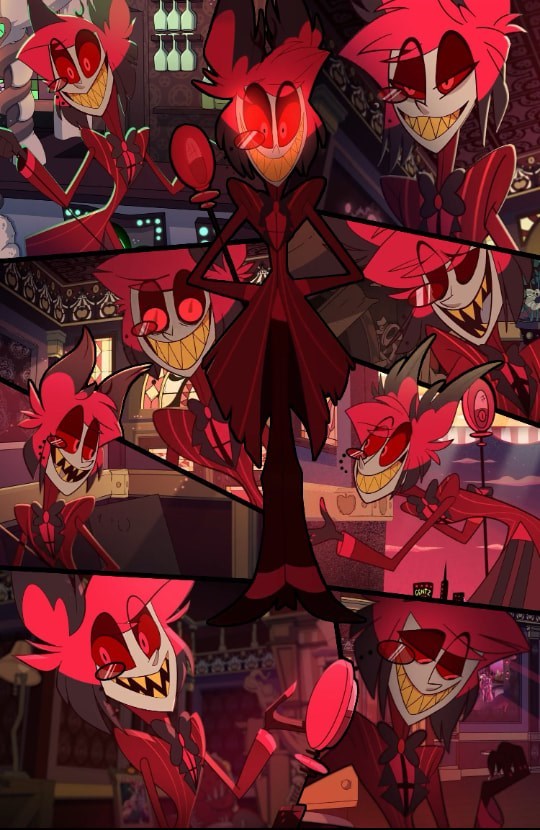
Tagline: “It’s time to tune in…”
Chapter One: “Heebie Jeebies”
Alastor arrives in Hell in 1933. He lands in the street between a jazz club and a strip club. He arrives naked and afraid, shocked by his new deer-like appearance. He has a black and red deer tail, antlers, red and black hair, sharp yellow teeth, red eyes, scarred gray back and chest, a regular size penis and gray scarred body. He is revolted by the tan gray gnarled state of his clawed hands and feet. When he talks, his voice has a radio filter, which surprises him. He realizes that it must be how he sounded to his audience. (Mimzy catches a peek at him but doesn’t yet know who he is). He summons his microphone staff, who is stunned to see Alastor nude. The microphone briefly glows, allowing Alastor to go on the air. Alastor realizes that Hell is a lot bigger and scarier than New Orleans. Demons mock him, including perverted ones. His memories coming back to him and instincts, Alastor quickly takes out the surrounding creeps with his bare hands, stealing their overalls and clothes. Alastor first wears brown too-loose pants and a white torn v neck shirt. So far, his only powers consist of controlling radios and brief bursts of fire.
Alastor then witnesses the harsh reality of Hell, daily discrimination, turf wars, killings, rapes and stealing. He then realizes that he has no place to live. It was the survival of the fittest from here on out. Alastor witnesses Tom Trench on TV, Sir Pentious and Baxter creating inventions, Mimzy performing at the jazz club and, of course, he learned of the royal family. Helsa and Seviathan and other Hell born spit at him, complaining that “common sinner scum” don’t belong in Hell. Alastor also sees a man with a radio head called Muse on an advertisement for 66.6 FM. Alastor gets mad that he was sent to Hell with his black stag demon father Neleus while his mother Poena got to go to heaven as a beautiful red doe humanoid sorceress.
Alastor camps out alone in the woods, deeply missing his mother and his old life. He wants to do something about all the sinners in Hell. A sense of duty came back to him…how he wanted to get rid of bad people, lost causes… an obligation to continue his work he had done on Earth. There were only a few people he could trust…and he decided to be untrustworthy and manipulative to everyone else.
Chapter Two: “All Of Me”
Alastor is reminded of what Furfur said after he sacrificed other humans to them on Earth. His microphone told him to find a grimoire that would allow him to summon Kalfu, and Abaddon to gain his magic. He asks a blue deer overlord and he tells him to look in Stolas’ palace, knowing that it was near impossible to get out alive. Rosie witnesses the conversation and decides to follow the sinner newcomer. Alastor sneaks into the palace to retrieve the grimoire, only to be caught by an angry Stolas. Alastor retrieves the book and is rescued from Stolas by a floating Rosie Poppins with an umbrella in her hands.
Alastor summons Kalfu, Baron Samedi and Furfur.
Furfur grants Alastor with heightened deer senses and destructive powers.
Baron Samedi grants Alastor with darkness and shadow powers.
Kalfu grants Alastor with fire and voodoo magic.
Alastor’s powers over radio were already his own when he arrived in Hell. This was why no mortal souls before him were seen with that much power; only powerful Hell-Born/Overlords had similar powers.
The prices Alastor paid for his powers were the collection of souls over the years, loss of his loved ones by fate, his own brutal death, being sent to Hell for his murders and a limit on his powers. Kalfu’s demons got a part of Alastor’s powers and Alastor can get tired after using a certain amount of energy. Alastor using blood magic drains energy, and he requires food, meat and rest to recover. Alastor can also be killed by angelic weapons.
Alastor’s powers include teleportation, shadow magic, portal creation, reality warping, conjuring fire and objects, possession, destructive magic, blood magic etc. The shadow demons get part of his power and after a painful separation, Alastor’s shadow is formed. The shadow, representative of Alastor’s darker thoughts, acts as a guide and bodyguard. Alastor creates his red tattered dress coat, black shoes with red deer tracks, his pants and his monocle. Alastor’s microphone allows him to be on the air anywhere to broadcast his massacres. The device reflects his mood as well, playing music and songs. The microphone can hypnotize demons who stare and listen to it and creates fatal radio waves that can blast brains out and destroy nearby buildings. With the help of his shadow, Alastor can travel from one shadow spot to another, through doorways and in small spaces. He can also travel through radios too.
In addition, Alastor can also shapeshift into others and into his red deer form. In his most powerful form, he appears as a bloodthirsty wendigo.
Alastor’s shadow is a manifestation of all his dark subconscious thoughts that are freed after he dies. The microphone staff is a manifestation of his radio host personality he had as a human. Alastor turned into a deer in Hell to remind him of his fate: “the hunter becomes the hunted.”
Chapter Three: “I’ve Got the World on a String”
Taking advantage, Alastor soon uses his powers to topple Overlords and take over many areas of Hell. He takes over 66.6FM, killing Muse and many Overlords (including Newspaper, Telephone, Clock, Car, Plane, Textile, Telegraph, Book and other Overlords. He makes a truce with the Overlord of Film.) Vox, Valentino and Velvet would arrive later. He forms an army of shadow demons and voodoo imps, his minions killing demons, burning stores, looting, feasting on deer and causing havoc.
Alastor becomes friends with the blue deer Overlord, a descendant of Furfur. The Overlord tells him where he can find his father, Neleus.
Alastor spends time with Lucifer too, drinking whisky, booze and singing. Lucifer likes polka music while Alastor prefers jazz. He treats Lilith well and watches as she performs on stage with her Resist band. (“God Spelled Backwards Is Dog”) Lucifer had been notified of Alastor’s powers and was intrigued. No mortal soul had power like the Hell Born elite before. Alastor even got a chance to dance with Lilith, him treating her like a lady and temporarily entranced by her beauty.
Alastor learned to stay on the king’s good side but can’t help getting curious about his unique daughter, Charlie. Lucifer talks about how Charlie sees the good in every sinner and her bond with Seviathan in Inferno high school (Charlie had not met Vaggie yet and Alastor wasn’t in love with Charlie, just curious about her, like finding a new specimen.). Knowing that getting too involved would lead to trouble, Alastor shrugs it off. Lucifer allows Alastor to do his chaos, provided he leave the royal family out of it, which he agrees.
Alastor makes deals with several demons and even temporarily gains access to Earth, gaining more souls. Alastor creates two hideouts: one a cabin with radio towers near a forest and an underground lair where the shadow spirits are (Deer’s Den).
Chapter Four: “The Axeman’s Jazz”
Alastor terrorizes Hell and uses an ax to kill off demons who don’t play jazz on his birthday. He even writes a letter similar to the Axeman’s letter:
Hell, 1933
They have never caught me and they never will. I am not a human being, but a demon from the hottest hell. I am what the Orleanians called the Louisiana Lunatic. Down here, I’m the inevitable Radio Demon.
When I see fit, I shall appear and claim other victims. I alone know whom they shall be. No clues will be left behind, save for what you might hear on the next broadcast.
Tell the Overlords and every sinner and Hell Born of the world to beware. Let them try not to discover who I am, for it’d be better for them not to have been born than to incur the wrath of the Radio Demon. You’ll have a deer in the headlights look and won’t have any idea what hit you until after it’s too late.
Undoubtedly, you denizens think of me as a monster and murderer. But if I wanted to hurt anyone else here, I would have done so already. If I wished, I could pay a visit to your city every night. I could kill every one of your best and worst citizens, for I am in a close relationship with the Shadows of the Other Side.
At 6:06 pm next Friday night, I am going to pass over Pentagram City. I am going to make a little proposition to you people. Here it is:
I am very fond of jazz music, electro swing, and jambalaya. I swear by all the Loas and deities that I will spare those who can provide me with some great entertainment when I visit. Word of warning, I can read you people like a book, and see into your very souls. Anyone foolish enough to challenge me will have their corpses consumed and their screams muffled by the lovely sound of jazz bands jamming the night away.
I have been, am, and will be, the worst spirit that ever existed.
Smile and stay tuned!
To make a deal with Alastor, call 666 - 024 - 1929 on your hellphone.
(Edward’s number is 24, 666 is the Beast number and 1929 is the year of the major Stock Market Crash)
Chapter One: “Practically Perfect In Every Way”
Hell Born Rosie Marie Poppins and Alastor properly meet shortly after he gains his powers. Rosie introduces Alastor to an elite group of cannibals, and Alastor happily accepts her invitation, thus further increasing his influence. Under the teachings of Rosie, Alastor learns how to increase his status, despite being a sinner. Due to being close to Rosie, less people insult Alastor as he walks by. He learns what it’s like to be a cannibal for the first time, and his hunger never ends since. Alastor begins to miss Kalfu and his Loa interactions (and his mother). He originally thought that he would pass through the seven gates of Guinee, the land of the dead in Loa culture. Rosie and Alastor bond over tea, coffee and murder. Rosie offers Alastor the position of Overlord but Alastor declines, as he wants to be free to wreak havoc without rules. He also shows a distaste for the greedy Overlords and authority figures. Rosie said that there are several sinners who are Overlords as well, but he still declines. Alastor would be his own Overlord!
“I was never destined to be part of any high hat group of leaders. I’ve worked exclusively for myself in my last life and will continue to do so in this one. With enough allies and the right timing, I could take them all down one by one. Besides, their meetings sound boring anyway.” - Alastor
Rosie used to work with her girlfriend Franklin until she died and Rosie got to own the shop for herself.
In return for Rosie helping Alastor get the spellbook, Alastor treats her like a lady and helps promote her emporium and spqeakeasy. Rosie recalls how she treats her employees cruelly and uses their wages to live a lavish life. Rosie is a cruel CEO who pursues rich and powerful men (and like the Dolly Sisters, she dances and performs as well). They both laugh as they share stories of taking advantage of other demons. Despite being Hell Born, Rosie does not treat Alastor with contempt due to his status as a sinner. (Or if she does, she hides it). Rosie becomes a stern-mother-like figure to Alastor, chiding him for any stupid mistakes he makes.
Rosie later gives Alastor advice such as being more open with Mimzy or to not fall for Charlie and be at the Hazbin Hotel (she finds the idea of redemption ridiculous. Despite this, Alastor still offers to help Charlie anyway due to seeking entertainment and potentially the trust of the royal family). Rosie also is a model for an All Soul’s Day/Death Day festival. Zombies, ghosts and other denizens watch as she poses on a blood red carpet in her rose garden. Like Day of the Dead, Death Day is a day to celebrate when sinners arrived in Hell and when the Hell-Born were born.
Unbeknownst to Alastor, Rosie secretly hopes she can gain some of Alastor’s power for herself so she can create Hell into a more orderly place where people admire her and her beauty. Deep down, she believes that Hell Born are superior to sinners, and would be pleased to see the lower class be her slaves! She forms an alliance with Lucifer, Lilith and the Eldritch family who are frequent buyers of her dresses and wares. Rosie works with Lucifer and the Eldritch family to try and bring Charlie down, saying her idea will never work. From Lucifer, Rosie learned of Charlie’s plan to redeem sinners. Redeeming sinners could mess up the hierarchy system and Rosie and the higher ups don’t want that. Her demonic form consists of a vulture like creature hovering in the air with an umbrella. Being in a position of power, it’s no surprise that she wants more of it! She even attempts to hold Mimzy and Charlie hostage to try and bring Alastor down.
Chapter Two: “Eat a Little Flesh Fantastic”
Alastor and Rosie sing the cannibal song after Rosie introduces Alastor to the elite cannibal group of Victorian ladies. Everyone dances like in the Mary Poppins movie as Rosie calls on her group members to ”go forth and feast.”
“Eat a Little Flesh Fantastic”
Alastor and Rosie strolled arm in arm after Rosie finished going to an Overlord meeting.
“Hey Alastor,” said Rosie turning to him. “Have you ever considered joining my exclusive club of socialites?”
“No, I haven’t…but do entertain me.”
“It’s mainly me and my group of ladies. We meet up for tea and coffee at this nice café not too far from here. We discuss the latest news, perhaps exchange jewelry or deserts.”
“Sounds lovely, my dear.”
“Oh and here’s the best part. My group and I have…exquisite tastes when it comes to meals. And I’ve heard about you and your slaughters.”
Alastor couldn’t help but puff up his chest in pride. “I was also a very skilled hunter in my other life. I’ve made many meals including jambalaya with venison in it. It is my favorite.”
A grin of sharp teeth stretched across Rosie’s pale face, her black eyes shining. “Have you ever considered eating the flesh of your victims?”
Alastor’s stomach growled at the thought. “I had a feeling that something was missing after I killed all those men as a human. I’ve hunted and ate deer and game many times. Perhaps I was too unsure about doing the same to other humans.”
Rosie laughed. “No restrictions now, though. This is Hell. Feel free to eat whatever…and whomever you’d like.”
Rosie handed him a blue arm of a nearby dead demon. Alastor maneuvered it into his mouth and sliced it to bits with several noisy bites. The sharp fangs effortlessly tore through the muscle and bone. The tangy taste of blood and juicy meat filled his mouth before he swallowed.
“That was quite tasty,” he remarked, licking his lips. Alastor then realized something extraordinary: there were countless demons roaming around in Hell. It was as if Hell had decided to provide him with an all-you-can-eat buffet. Not only would he have more meat to eat, but being a cannibal would also help with his fearsome reputation. Cannibalism was considered one of the worst taboos to do on Earth.
Why not add another sin to his list?
Alastor bowed and kissed Rosie on her hand in thanks. “Even in death, I learn something new every day. I’d be honored to join you.”
Rosie introduced Alastor to her group of friends: a bunch of demon women dressed in fancy Victorian dresses of many colors and round ladies’ hats on their heads. Violet, Lavender, and Poppy were some of their names. For a brief moment, Alastor felt like he was back in his time period on Earth. He ate demon meat to his heart’s content. Hell-Born or sinner, raw or cooked, it didn’t matter. He used the flesh and the sinner’s hearts in his jambalaya recipes. As the sinners had previously been human like Alastor used to be, he was now a cannibal.
The thought of someday tasting actual humans in the living world made his mouth water more.
On Sunday mornings after Alastor had coffee, he would be greeted by his new admirers while he walked outside, humming a cheery tune.
“Hello ladies,” Alastor said with a tip of his red top hat.
“Hello Alastor!” they chimed, as they sat on the ground in front of a mutilated body of a demon. One woman picked up the demon’s separated arm and used it to wave at him. Alastor chuckled and strolled on.
During one moonlit night, Alastor and Rosie decided to sing a song to strengthen their bond. They were already good friends, if not that then at least compatible associates with similar tastes. She looked like a gaunt Mary Poppins entering a Day of the Dead musical.
Rosie:
“Let’s say you’re bored and want to be full,
Sure, you can go about your day, dull. Or…
You can eat a little flesh fantastic with me.”
Alastor:
“If you live your days in wonder, but can’t focus due to hunger…
Just eat a little flesh fantastic with me.”
Rosie:
“For if you decide to kill a person, their body will someday rot away. But if you make haste and not let it go to waste…
Then you’ll be satiated for the day!”
Alastor:
“You don’t need to be Lector Hannibal, to consider the life of a cannibal.”
Rosie: “Want to be robust?”
Alastor: “You know I must.”
Both: “Come eat a little flesh fantastic with us!”
Rosie (speaking): “My fellow epicureans, answer my call. May your gluttonous desires led the way!”
“Welcome to the club, Radio Demon.”
Rosie and Alastor:
“The life of a cannibal The feeling is so wonderful Hunt and kill, munch, munch, munch, A few screams later, you’ve got your lunch!”
“Have some style and show some class It is us among the mass When you’re feeling beat and want to eat A demon can never have too much meat!”
“Eat a little flesh fantastic with us Give in to another kind of lust A sweet treat you are, come near or far
Our food as you bite the dust!”
Rosie:
“You can refrain and boldly exclaim ‘Eating your brethren’s not right!’”
Alastor: “But we know well, to maim in Hell The blood will be shed tonight!”
Rosie:
“The life of a cannibal,”
Alastor:
“The feeling is so wonderful,”
Rosie:
“Hunt and kill, munch, munch, munch…”
Both:
“A few screams later, you’ve got your lunch!” “Eat a little flesh fantastic with us!” (oh- oh- oh- oh- oh) “Eat a little flesh fantastic with us!” (oh- oh- oh- oh- oh)
Chapter Three: “Hello Mimzy!” (Hello Dolly! By Louis Armstrong)
Alastor bonds with Mimzy Dolly Hannigan at the jazz club and they recall their memories together in New Orleans. Mimzy works as an employer for Rosie at her emporium and squeak-easy. Rosie, enamored with Mimzy’s performance, decided to offer her a job to increase her influence. Like Alastor, Mimzy is more protected thanks to Rosie’s overlord status. Mimzy helps sell Rosie’s custom made clothes and antiques and performs almost every night at the underground bar behind Rosie’s shop. (Behind a door, down a stair-case. The password is “Practically perfect in every way.”)
Several times, Alastor and Mimzy dance and sing at the squeak-easy, to the joy of the crowd. At the squeak-easy, influential people and criminals gather there to discuss business, drink and have fun. Husk also goes there on occasion to serve drinks. Mimzy is popular both there and at her own jazz club: Mimzy’s Place. Rosie, herself, has performed there after her shifts. When asked if Rosie treats her cruelly, Mimzy says, “Almost never.”
Mimzy had died in the 1920s before Alastor. They agree to sing and stay friends, along with Rosie, creating a trio of singing, dancing, drinking and murder-spree-loving friends. They also terrorize orphans as they sing “Little Sinners” (Little Girls). Alastor apologizes for accidentally killing her and being aloof. Mimzy then apologizes for being too clingy with him and claiming that he didn’t know how to love back on Earth.
Mimzy lives a lavish lifestyle (like the Dolly Sisters, she pursues wealthy men and dances).
Alastor later offers Mimzy an invitation to visit the Hazbin Hotel and discusses the idea of redemption. Mimzy accepts his offer and decides to stay there, so long as she can still do her performances. Mimzy eventually becomes a guest at the Hazbin Hotel along with Baxter, Tom Trench, Molly, Arackniss, Cherri Bomb and Crymini. She bonds with Alastor, Niffty and Charlie as the girls gossip about men and the group performs in musicals together. Mimzy shares her story about being in New Orleans and with Alastor’s encouragement, she also thinks about pursuing redemption…as long as she gets more fame/recognition. Like Niffty, she gets jealous when Alastor pursues Charlie more. Mimzy thinks that Alastor loves Charlie more, but Rosie suspects he has another motive.
Alastor and Mimzy dance some more together and frequently perform at the jazz club.
Prequel Comic:
“Let’s go for a stroll.”
Comic by Liam (Pencils), Fautisse (Lineart), Lunetta (Colors), Magpie (Backgrounds) and Vivienne (Story).
Alastor enjoys coffee on a Sunday morning. Alastor hums down the street, goes to a café and watches birds fight over food. He stops to smell the roses, making one wilt with his touch. Everyone flees when they see him, making him a bit lonely inside. While visiting Rosie’s cannibal colony, he tosses his hat to the four admiring well-dressed women who eat a demon body. Alastor tosses a coin to a cat jazz player and swears after seeing Vox. He hates him so much, that his gentleman demeanor was gone. Alastor then saves a sheep demon lady from a butcher boar, kills the man, then enjoys the meat. (More to come)
Part 20: Alastor’s Redemption – Mother Reunite and Heaven
The villains eventually get defeated. (Assuming no one dies a second time) Eventually, Alastor gets redeemed and turns into a human/hart hybrid angel. Alastor never forgets about Charlie and how wonderful a person she was. They share a hug and kiss before Alastor leaves with his mother and Charlie stays to rule Hell. He reunites with his mother and they go to Heaven for a while. Alastor hosts shows in Heaven, and teaches the Angels how to make jambalaya and do dad jokes (He remarks their food is plain and boring). Alastor and his mother eventually depart for the seven Guinee gates with the Loa after they are accepted at last by Baron Samedi. For the only place where Alastor truly belonged was not Earth, Hell or Heaven, but with his family and culture.
Angel Dust gets to have private fun with guys in Heaven, while he continues to work on curbing his addicting habits. Molly, Arackniss, and Angel/Anthony reunite with their white spider mother Aranea. Husk finds true love with…Angel Dust! Husk performs magic shows for everyone and plays card games without betting as he has plenty of money and comfort. Alastor reunites with his mother and spends quality time with Mimzy before going to Guinee. (But Alastor will always remember Charlie!) Autumn, the Zoophobia deer and Alastor become friendly rivals. Vaggie reunites with her family (minus Valentino, her father) and marries another woman in happiness (but of course, never forgetting Charlie and what she did to help make their new lives comfortable!). Tom Trench, now mask free and blonde, hosts Holy 333 News. Zoophobia animal characters make cameos as denizens of Heaven. Sir Pentious or Baxter creates inventions and healing potion for the greater good instead of drugs and weapons and evil aquatic creatures. Roo and Cherri are BFFs along with Angel. Niffty marries a kind man in Heaven. All the characters take their time in healing from their wounds and experiences.
Vaggie, Angel Dust, Husk, Alastor, Baxter, Mimzy, Crymini, Roo, Villa, Tom Trench, Cherri Bomb, Arackniss and Molly all get redeemed. (Niffty may be is secretly evil). Charlie succeeds in redeeming sinners but eventually has to let her redeemed friends go.
I.M.P. and C.H.E.R.U.B. are still in business for many years. Blitzo lives his musical theater dream and Loona is by his side, arm in arm with Crymini.
Centuries later, Charlie marries a woman similar to Vaggie in Hell. Through a willing man, Charlie gives birth to two children who eventually take Charlie’s place as the Hotel managers when Charlie grows old. (Yes, she ages very slowly!) Her children are the next generation of do-gooders in Hell.
The show ends with all the characters dancing and singing under rainbows while “That’s a wrap!” shows up.
34 notes
·
View notes
Photo

Fet Gede
47 notes
·
View notes
Note
Hc: Chucky low-key celebrates voodoo holidays. He doesn't go all out and dress up, but he does do a standard Mange Loa where he offers the loa drinks, cakes, syrups, etc. He also celebrates Fet Gede, where he slightly paints his face, blackening out his eyes and nose and outlining along his face to make him seem skeletal, and roams the streets. This way Andy or the others won't see him as he's on some building roof, offering more to the loa and praying for those he killed.
Mmm I love that.
I want the spiritual aspect to be explored more, tbh. It’s a huge disappointment to me that we could have had more of that in the films ://
Also hc that this is when he and kristen start building a really good friendship, since she is drawn to it as well.
8 notes
·
View notes
